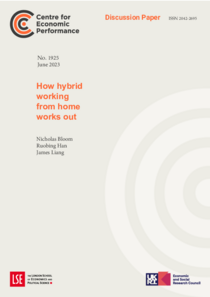How hybrid working from home works out

Bloom, Nicholas ; Han, Ruobing ; Liang, James
London School of Economics and Political Science. Centre for Economic Performance
LSE - London
2023
49 p.
telework ; technology ; job satisfaction ; productivity ; epidemic disease ; survey
CEP Discussion Paper
1925
Work organization
http://cep.lse.ac.uk/pubs/download/dp1925.pdf
English
Bibliogr.
"Hybrid working from home (WFH), whereby employees work a mix of days at home and at work each week, has become dominant for graduate employees in the US. This paper evaluates a randomized control trial on 1612 engineers, marketing and finance employees of a large technology firm that allowed odd birthday employees to WFH on Wednesday and Friday and kept even birthday employees full time in the office. There are four key results. First, WFH reduced attrition rates by 35% and improved self-reported work satisfaction scores, highlighting how employees place a considerable value on this amenity. Second, WFH reduced hours worked on home days but increased it on other work days and the weekend, highlighting how home-working alters the structure of the working week. Third, WFH employees increased individual messaging and group video call communication, even when in the office, reflecting the impact of remote work on working patterns. Finally, while there was no significant impact of WFH on performance ratings or promotions, lines of code written increased by 8%, and employees' self-assessed productivity was up 1.8%, suggesting a small positive impact. Given these benefits for retention, job satisfaction, and productivity, after the experiment ended the firm extended hybrid WFH to the entire company."
Digital
The ETUI is co-funded by the European Union. Views and opinions expressed are however those of the author(s) only and do not necessarily reflect those of the European Union or the ETUI.